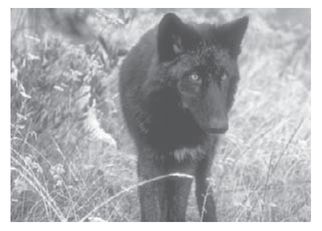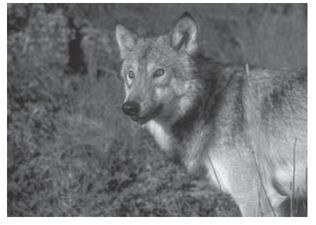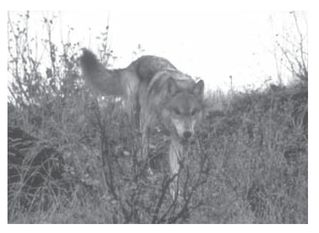3 Among the Wolves (8 page)
Read 3 Among the Wolves Online
Authors: Helen Thayer

By mid-May, three weeks after our arrival at Wolf Camp One, we had become a familiar fixture rather than an intrusion. The wolves responded by going about their lives in a less watchful fashion. They still kept a sometimes cautious eye on us, but they did so in an increasingly confident, even somewhat friendly manner. They had no problem with Charlie; it was Bill and I who had to gain their trust. Even the young wolves became more relaxed, engaging in their playful antics as they became accustomed to our presence. This change was encouraging, since the two teenagers had been frantic at the sight of us during our first encounter.
Early morning was often quiet after Denali led most of the pack on a hunt. Usually they left during the night or just before daybreak. At first the teenagers stayed close to the den or wandered about inspecting rocks and the nearby ridge. As the weeks went by, they joined the hunts more frequently.
Charlie quickly settled in. He claimed his property without apology, even to the point of excess. His proud carriage and domineering attitude became more wolflike as he confidently paraded about his territory. Always gentle and affectionate toward us, Charlie always presented himself as our alpha. We were his pack to protect and guide.
Another storm roared across the ridges for two days, but our sheltered valley escaped the full brunt of the raging wind. Usually Alpha, Denali, or Omega, and sometimes all three, stood on the ridge top in the early light, watching for potential prey. But during this bad weather the wolves stayed close to the dugouts and den. Once the sky cleared, they immediately resumed their posts.
Late one evening as we sat writing in our journals, we noticed that the entire family, except Mother, who was inside the den, had gathered about the entrance. All were tense, even the teenagers. They paced about or sat and stared at the den as if expecting something to happen. Charlie stayed close to the boundary nearest the pack, also expectant. After two hours, Alpha, who had remained closest to the entrance, abruptly got to his feet and disappeared inside. A few minutes later he emerged. The family milled about him in happy unison, licking muzzles, wagging tails, and nudging each other's shoulders. Charlie stood too, wagging his tail and yipping. Mother still had not joined the group.
Then it dawned on us: Newborn pups must be the reason for the excitement.
In warmer climates, pups are usually born in April and sometimes in early May, but above the Arctic Circle young arrive later to coincide with warmer weather. After the giddy
celebration ended, the wolves relaxed and went back to normal activitiesâall except Alpha, who remained close to the den entrance. About midnight, he climbed inside and stayed there until daylight.
celebration ended, the wolves relaxed and went back to normal activitiesâall except Alpha, who remained close to the den entrance. About midnight, he climbed inside and stayed there until daylight.
Charlie returned to the tent and slept soundly by himself on my sleeping bag. Bill and I stayed up all night, determined not to miss a thing. It was a humbling experience for us to witness the family's reaction to the birth of pups. We realized that even though we had been accepted and a bond of reasonable trust had developed, we humans still sat at the edge of wolf life. We could never hope to enter the innermost circle of a family's emotions, yet we were awed by what we witnessed.
We wondered how long it would take for Mother to trust us enough to allow her pups out of the den. Normally they emerge at about three or four weeks; we hoped our presence wouldn't delay the event.
Generally only the alpha male and alpha female, the two highest-ranking wolves in a pack, have pups each year. Often the pair mate for life. Alpha was clearly the father of Mother's pups, but all the wolves helped raise the youngsters. Throughout the summer months, the offspring remained the center of attention for the entire family.
The next day all returned to normal, except that Mother remained out of sight. Alpha and Denali went for a short hunt, and each returned with a hare. Alpha took his catch into the den while Denali gave his to the rest of the pack. Omega stood back and then inched forward, low to the ground, with his tail firmly tucked beneath his body. Just in time he carefully reached forward, grabbed a foot, and trotted off alone to eat. Later Alpha emerged without his hare, which we guessed had been a gift to Mother.
The following morning before dawn, we opened our tent door and looked up to see Alpha, Denali, and Omega standing side by side, completely still, gazing intently into the distance.
Suddenly they bounded down the steep slope to the den, where the pack reverently greeted them with tail wagging and excited yipping. Then Denali and Alpha raced off to the north with Omega and Beta close behind. A hunt was on. They quickly disappeared, leaving us to guess at their prey.
Suddenly they bounded down the steep slope to the den, where the pack reverently greeted them with tail wagging and excited yipping. Then Denali and Alpha raced off to the north with Omega and Beta close behind. A hunt was on. They quickly disappeared, leaving us to guess at their prey.
We longed to see a hunt, but bided our time before attempting to follow them. Of course, we realized there would be difficulties. If they traveled far, we could not keep up with their blazing speed and stamina. Perhaps we could camp on a high place to observe their hunt, or pursue them on one of their shorter jaunts.

Alpha, a strict but benevolent leader.
At noon all four wolves, with Alpha in the lead, came loping back with food in their jaws. They had killed a moose calf, and their distended bellies showed that they had dined well before heading for home. Alpha took food into the den, while the others dropped their catch on the ground for the rest of the pack. There was so much that Omega ate his fill without having to beg. The teens ate to capacity as well. Then Yukon attempted to carry a leg bone away, but Klondike claimed it as her own.
Just as the battle began, Alpha emerged from the den. With a snarl he nipped Klondike's rear and stood over her as she rolled onto her back, exposing her belly in submission. Yukon picked up the bone and disappeared behind a rock to chew in peace.
After a session of unabashed gorging on the moose carcass, the wolves were too satiated to play. One by one, they lay down in various poses to sleep and perhaps dream of the next hunt. Some moved into the forest, while others sought the shade of a rock overhang. For a time Alpha slept on his back with all four feet pointing skyward. When he changed position he rose to
his feet, walked around in tight circles three or four times like a dog, then curled up with his nose tucked under his tail and slept soundly. All was quiet for the next two hours, with only Yukon and Klondike changing to more comfortable positions.
his feet, walked around in tight circles three or four times like a dog, then curled up with his nose tucked under his tail and slept soundly. All was quiet for the next two hours, with only Yukon and Klondike changing to more comfortable positions.
Mosquitoes finally forced the wolves to awaken with cavernous yawns and long stretches. But it was still a lazy time with little to do except relax, swat at the pesky insects, and stare into the distance, with an occasional visit to the creek for a drink. Denali eventually climbed the den ridge to watch for prey, but after a few minutes he relaxed at his watch post and slept. Yukon picked up a piece of moose hide and placed it carefully behind a rock, reserving it to be a toy for a future game, then stretched out again.
Two days later, we saw Mother leave the den briefly. She sniffed the rocks close by, then strolled to the stream to drink. Her belly was less distended, and she looked sleek and healthy. She lay in the sun for an hour before returning to the womblike den. During the first week after the birth, Mother spent most of her time inside, leaving only to relieve herself, drink from the stream, or briefly nap in the sun. The rest of the pack supplied her with food, which Alpha always took to her.
Later, Mother spent increasing time outside sunning and eating food that Alpha and sometimes Denali left for her. Now and then Beta lay alongside Mother and gently licked her face. Mother's personality had mellowed considerably, and she became the object of affection. Even the teenagers took time out from their games to lick Mother and raise a paw to her shoulder or roll over, exposing their underbellies.
The wolves frequently displayed fondness for each other. They played together, shared food, and generally lived a harmonious life. Sometimes they teased a particular wolf, then raced away with the victim in pursuit. They rolled and leaped, raced up and down the ridges, and even played hide and seek. Occasionally, one wolf brought back a stick and dared another
to steal it. When the teenagers broke the rules they were disciplined, sometimes severely, but they were always forgiven.
to steal it. When the teenagers broke the rules they were disciplined, sometimes severely, but they were always forgiven.
Charlie's days were busier than ours. After all, he had the responsibility of keeping his boundary marked as well as sniffing scents left by the neighbors. He observed their various games closely, and when a hunting party returned he always stood up to see what they had caught.
Now, in the latter part of May, Charlie no longer presented a submissive posture. He stood tall, with his tail curled above his back, displaying his alpha status. He had gained the confidence of the pack. His dog habits diminished, and his bearing and attitude became more authoritative. He continued his gentle approach with Bill and me, but plainly, he was the alpha and we were his charges.
Often one or two wolves would stroll over to the nearby rocks and, while relaxing in the shade, they would watch Charlie. Their casual postures and gentle facial expressions displayed friendliness. He was at home around them and enjoyed their company. We suspected that the wolves might have invited Charlie to join them at the den. At times he begged to be let off his long leash, but we were afraid to grant his wish. Perhaps we were too cautious, but we could not chance anything when it came to Charlie's safety.
At one point during a particularly energetic game of tug-of-war between Yukon and Klondike, Charlie walked closer, wagging his tail as though asking to join in. The teens stopped and wagged their tails briefly, but gave no sign of invitation. We quietly called Charlie back, and he returned to his favorite mossy spot to watch as the game resumed. We hoped he wasn't too disappointed, and yet we were relieved. We had no intention of allowing Charlie to join the wolves. If trouble developed, we would be unable to defend him.
One night as we slept with Charlie in his usual position on my sleeping bag, a chorus of howls suddenly erupted from the ridge right above us. We crawled outside with Charlie in the lead. Alpha and Beta were facing each other, muzzles lifted skyward. Long mournful sounds flowed from them. The rest of the animals positioned themselves along the ridge. Facing south, led by Alpha, they howled into the summer night. If we had not known how many voices were in this wild chorus, we could have easily estimated many more.

Mother watches us with suspicion.
Charlie remained silent, facing south and listening intently as the concert unfolded. Each wolf used a different note and volume, creating the impression of large numbers. The notes rose in volume and pitch, then sometimes descended, pausing in the silence, then once more reached a crescendo. At times one or two wolves resorted to yipping notes in odd contrast. The untamed melody unsettled the night. Their voices echoed off the surrounding mountainsides and filled the valley with music from the wild.
The howl of a wolf is perhaps the most unforgettable of all wilderness sounds. Scientists speculate that wolves howl for many reasons. In addition to the sheer joy of a community singalong, they howl to communicate with neighboring packs, to establish dominance over their own hunting range, and to inhibit trespassing by hostile wolves. They often howl immediately before a hunt and sometimes communicate with each other when separated during a long chase. Dispersing loner wolves howl to attract a mate, and packs frequently howl during the breeding season. Howling also emphasizes the messages left on the many urine scent marks on logs, rocks, and
trees scattered throughout and along the boundaries of the pack's hunting range. A wolf's ability to increase and decrease volume as it slides its harmonics up and down the scale can cause a listener to assume that there are many more animals in a group than there really are, an advantage if attempting to discourage a threatening pack.
trees scattered throughout and along the boundaries of the pack's hunting range. A wolf's ability to increase and decrease volume as it slides its harmonics up and down the scale can cause a listener to assume that there are many more animals in a group than there really are, an advantage if attempting to discourage a threatening pack.

Other books
B007P4V3G4 EBOK by Richard Huijing
Silent Treatment by Michael Palmer
HARD KNOX by Jaxson Kidman
From Seduction to Submission by R.R. Greaves
Rapture's Edge by J. T. Geissinger
Another Country by Kate Hewitt
Wasteland Rules: A New Dawn (The World After Book 3) by J.G. Martin
Four Dukes and a Devil by Maxwell, Cathy, Warren, Tracy Anne, Frost, Jeaniene, Nash, Sophia, Fox, Elaine
Blood Ties by Gabriella Poole
Christmas With the Dead by Joe R. Lansdale